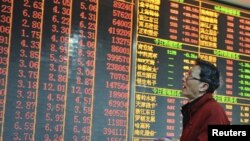BANGKOK —
A new United Nations economic survey says slower growth in China and India due to Europe’s downturn and weak U.S. growth undermines the Asia-Pacific economic outlook. The U.N.’s Economic and Social Commission for Asia and the Pacific (UNESCAP) says while regional growth will begin to recover in 2013, fewer people are likely to escape poverty amid a widening in income gaps.
Economists from the U.N’s Economic and Social Commission for Asia and the Pacific - UNESCAP -- say Europe’s recession and anemic U.S. growth are biting into the Asia-Pacific economies, especially China, the key regional economic driving force.
The agency's mid-year review, released Friday, lowers expectations for growth in the Asia Pacific to 5.6 percent for 2012 from an earlier 6.5 percent. But economists hope for a recovery in 2013.
China’s economic growth slowed to 7.8 percent this year - and Asia-Pacific economies dependent on China's growth for their own exports felt even greater pain.
Regional growth forecasts were cut by almost one percent.
Growth in economies such as Taiwan, South Korea and Hong Kong was directly affected by China’s slowing growth.
Asia fared better in the 2008 economic crisis than did Europe and the U.S. But Anisuzzaman Chowdhury, director of ESCAP’s macroeconomic policy and development division, says the region has been unable to avoid the effects of prolonged weakness and uncertainty in the large developed economies.
“Now having shown resilience after the crisis we are beginning to see the impact because there is a limit up to which you resist the problem in the eurozone countries [which] is still continuing and we don’t know when it’s going to be resolved,” said Chowdhury.
He says there also are concerns about widening income gaps in East Asia, as well as weak social protection mechanisms. He warns any slowing in East Asian growth leaves millions at risk of falling back into poverty.
"Even though we say that Asia-Pacific region has done very well in terms of reducing poverty it is true, but at least four million people are just above the poverty line and any small shock will push them back," Chowdhury said. "So that’s what it means to be sitting between $1.0 and $2.50 [day]. We need strong social protection to get them if they really fall.”
The report says the entire East Asian economy remains hampered by infrastructure shortages.
In 2013, the report forecasts that growth will remain below the region's potential with “strong headwinds persisting” - mainly China's continued slowdown, sluggish world trade and lower commodity prices.
Economists from the U.N’s Economic and Social Commission for Asia and the Pacific - UNESCAP -- say Europe’s recession and anemic U.S. growth are biting into the Asia-Pacific economies, especially China, the key regional economic driving force.
The agency's mid-year review, released Friday, lowers expectations for growth in the Asia Pacific to 5.6 percent for 2012 from an earlier 6.5 percent. But economists hope for a recovery in 2013.
China’s economic growth slowed to 7.8 percent this year - and Asia-Pacific economies dependent on China's growth for their own exports felt even greater pain.
Regional growth forecasts were cut by almost one percent.
Growth in economies such as Taiwan, South Korea and Hong Kong was directly affected by China’s slowing growth.
Asia fared better in the 2008 economic crisis than did Europe and the U.S. But Anisuzzaman Chowdhury, director of ESCAP’s macroeconomic policy and development division, says the region has been unable to avoid the effects of prolonged weakness and uncertainty in the large developed economies.
“Now having shown resilience after the crisis we are beginning to see the impact because there is a limit up to which you resist the problem in the eurozone countries [which] is still continuing and we don’t know when it’s going to be resolved,” said Chowdhury.
He says there also are concerns about widening income gaps in East Asia, as well as weak social protection mechanisms. He warns any slowing in East Asian growth leaves millions at risk of falling back into poverty.
"Even though we say that Asia-Pacific region has done very well in terms of reducing poverty it is true, but at least four million people are just above the poverty line and any small shock will push them back," Chowdhury said. "So that’s what it means to be sitting between $1.0 and $2.50 [day]. We need strong social protection to get them if they really fall.”
The report says the entire East Asian economy remains hampered by infrastructure shortages.
In 2013, the report forecasts that growth will remain below the region's potential with “strong headwinds persisting” - mainly China's continued slowdown, sluggish world trade and lower commodity prices.











